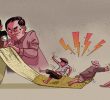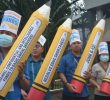DAVAO CITY, Philippines—Health officials here expressed concern as the number of Human Immunodeficiency Virus-Acquired Immunodeficiency Syndrome (HIV-Aids) cases in this city rose with more young people engaging in unprotected sex.
The Reproductive Health and Wellness Center reported that a total of 52 individuals confirmed with HIV-AIDS HIV in February, placing Davao region as Top 5 with most number of cases among all other regions.
The National Capital Region (NCR) topped the list of most number of cases with 310 cases, followed closely by Region 4A with 129 cases, Region 3 with 102 cases, Region 7 with 79 cases. Two pregnant women were diagnosed with HIV, one from Region 4A and the other from Region 7.
Of the total 849 new HIV cases in February alone, 52 are from Davao region while 39 are from Davao City based on the HIV/AIDS & Art Registry of the Philippines (HARP), according to HIV Core Team Head Nurse Eric Prias who told reporters in a press conference on Thursday.
Prias, however, pointed out that the HIV-AIDS cases in the region are increasing especially with age ranges from 25-34 years old.
A HARP record from the DOH Epidemiology Bureau showed that out of 39 HIV positive individuals in the city, 33 are male while 6 are female.
The highest number of age group recorded in the Davao City in February is 15-24 having 19 cases, followed by 25-34 with 14 cases, and 35-49 with 6, a slight difference from the statistics in January-December 2016 where the age group 25-34 topped the list with 36 cases.
The age group data has raised a “red flag” among health officials.
“We have a problem right now. We are facing a challenge in terms of responding to our young people today. Imagine in 2015, as young as 13 has HIV. This is a reality,” Priscilla Senoc, the health education and promotion of RHWC said.
Based on the same record, 38 adolescents aged 10-19 were infected through sexual contact (5 male-female sex, 22 male-male sex, 11 sex with both males and females).
“We have this development in terms of structure, economic and political, we also have to face this challenge. Young people today is a challenge,” she pointed out.
She challenged the parents to do more on proper parenting and educate their children otherwise they will have to face the dreaded consequences of peer pressure.
“We have to help each other. We don’t want that one day we will wake up with HIV. We are all vulnerable to HIV,” Senoc added.
Individuals who engage into risky sexual behaviors, multiple-partners or in same sex relationship are vulnerable to the HIV-AIDS virus since the transmission is through unprotected sexual intercourse, transfusion of contaminated blood, sharing of contaminated needle, among others. (davaotoday.com)










